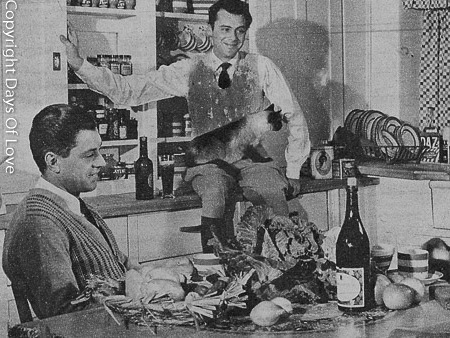Partner Anthony Forwood
Queer Places:
12 Hemstal Road, West Hampstead NW6 2AN
University College School, 11 Holly Hill, London NW3 6QN, Regno Unito
Chelsea College of Arts, University of the Arts London (UAL), 16 John Islip St, Westminster, London SW1P 4JU, Regno Unito
44 Chester Square, Belgravia, London SW1W 9EA, Regno Unito
2 Cadogan Gardens, Chelsea, London SW3 2RS, Regno Unito
Cobblestone House, Hascombe, Godalming GU8 4BT, Regno Unito
Le Haut Clermont, Chemin du Haut Clermont, 06740 Châteauneuf-Grasse, Francia
.jpg) Sir Dirk Bogarde (born Derek Jules Gaspard Ulric Niven van den Bogaerde; 28
March 1921 – 8 May 1999) was an English actor and writer. Initially a matinée
idol in films such as Doctor in the House (1954) for the Rank
Organisation, he later acted in art-house films. In a second career, he wrote
seven best-selling volumes of memoirs, six novels and a volume of collected
journalism, mainly from articles in The Daily Telegraph.
Sir Dirk Bogarde (born Derek Jules Gaspard Ulric Niven van den Bogaerde; 28
March 1921 – 8 May 1999) was an English actor and writer. Initially a matinée
idol in films such as Doctor in the House (1954) for the Rank
Organisation, he later acted in art-house films. In a second career, he wrote
seven best-selling volumes of memoirs, six novels and a volume of collected
journalism, mainly from articles in The Daily Telegraph.
Bogarde came to prominence in films including The Blue Lamp in the
early 1950s, before starring in the successful Doctor film series
(1954–63). He twice won the BAFTA Award for Best Actor in a Leading Role; for
The Servant (1963) and Darling (1965). His other notable film
roles included Victim (1961), Accident (1967), The Damned
(1969), Death in Venice (1971), The Night Porter (1974), A
Bridge Too Far (1977) and Despair (1978). He was appointed a
Commander of the Order of Arts and Letters in 1990 and a Knight Bachelor in
1992.
For many years he shared his homes, first in Amersham, Buckinghamshire,
then in France, with his partner
Anthony Forwood,
who was the former husband of actress Glynis Johns and the father of their
only child, actor Gareth Forwood. Bogarde repeatedly denied that their
relationship was anything other than platonic. Such denials were
understandable, mainly because male homosexual acts were criminal during most
of his career, and could lead to prosecution and imprisonment. Rank Studio
contracts included morality clauses, which provided for termination of the
contract in the event of 'immoral' conduct on the part of the actor. This
would have included same-sex relationships, thus potentially putting the
actor's career in jeopardy.[15]

It is possible that Bogarde's refusal to enter into a marriage of
convenience was a major reason for his failure to become a star in Hollywood,
together with the critical and commercial failure of Song Without End.
His friend Helena Bonham Carter believed Bogarde would not have been able to
come out during later life, since this might have demonstrated that he had
been forced to camouflage his sexual orientation during his film career.[16]
The actor John Fraser, however, said that "Dirk's life with Forwood had been
so respectable, their love for each other so profound and so enduring, it
would have been a glorious day for the pursuit of understanding and the
promotion of tolerance if he had screwed up the courage..."[17]
Bogarde suffered a minor stroke in November 1987, at a time when his
partner, Anthony Forwood, was dying of liver cancer and Parkinson's disease.
In September 1996, he underwent angioplasty to unblock arteries leading to his
heart and suffered a massive stroke following the operation.[18]
Bogarde was paralysed on one side of his body, which affected his speech and
left him in a wheelchair. He managed, however, to complete a final volume of
his autobiography, which covered the stroke and its effects as well as an
edition of his collected journalism, mainly for The Daily Telegraph. He
spent some time with his friend Lauren Bacall the day before he died. Bogarde
died at his home in London from a heart attack on 8 May 1999, age 78. His
ashes were scattered at his former estate in Grasse, Southern France.[19]
My published books:


BACK TO HOME PAGE

- https://en.wikipedia.org/wiki/Dirk_Bogarde
- Rossini, Gill. Same Sex Love 1700-1957: A History and Research Guide .
Pen and Sword. Edizione del Kindle.
.jpg) Sir Dirk Bogarde (born Derek Jules Gaspard Ulric Niven van den Bogaerde; 28
March 1921 – 8 May 1999) was an English actor and writer. Initially a matinée
idol in films such as Doctor in the House (1954) for the Rank
Organisation, he later acted in art-house films. In a second career, he wrote
seven best-selling volumes of memoirs, six novels and a volume of collected
journalism, mainly from articles in The Daily Telegraph.
Sir Dirk Bogarde (born Derek Jules Gaspard Ulric Niven van den Bogaerde; 28
March 1921 – 8 May 1999) was an English actor and writer. Initially a matinée
idol in films such as Doctor in the House (1954) for the Rank
Organisation, he later acted in art-house films. In a second career, he wrote
seven best-selling volumes of memoirs, six novels and a volume of collected
journalism, mainly from articles in The Daily Telegraph.

